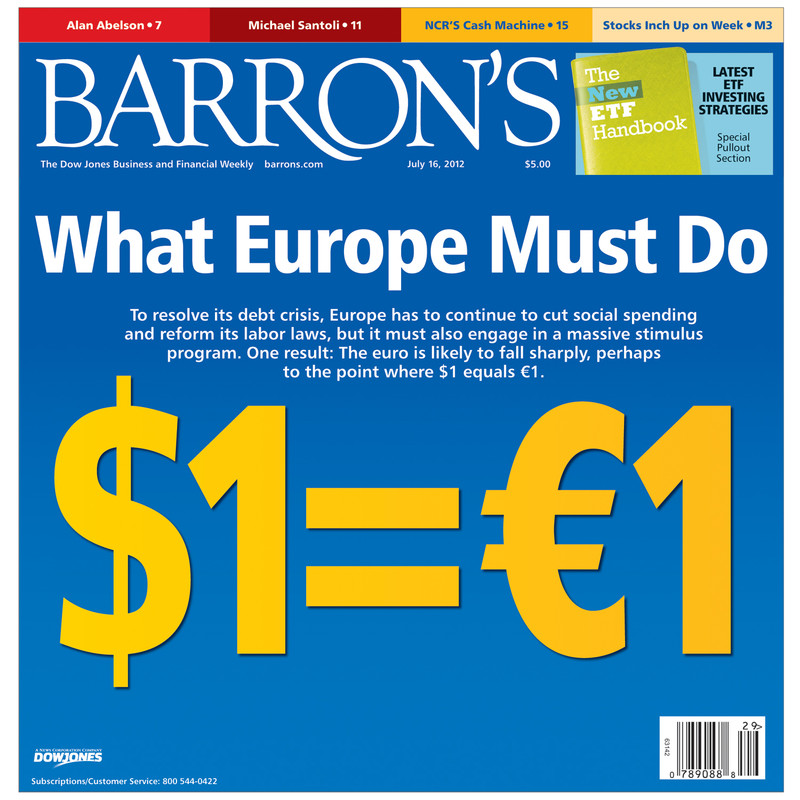Is it time for Germany to accept the fact that the only way out of economic hell is an export-led recovery, brought about by “dollar parity,” (a one for one exchange rate between dollar and euro) so that peripheral economies can become competitive again?
Is this the part where Germany gets over the fear of 3 to 4% inflation (as opposed to the current 2%) because a bit of inflation is a much better long-term risk than a break-up of the common currency?
Does the ECB need to just suck it up and start printing already? Do they need to blow up (devalue) the euro in order to save it?
Today’s cover story in Barron’s makes a highly compelling case that not only is this the best course of action, it may be the only one left once the austerity mandates and lending facilities have run their course. The basic idea is that the newly formed and almost funded ESM (Euro Stability Mechanism), which will begin with $500 billion – $100 billion of which is already going to Spain – could borrow from the ECB on an unlimited basis. This would be the closest thing the Euros have had to what the Fed/Treasury have done here in the states. It would drive the euro currency value down, allowing Spain and Italy to become more competitive on the global stage for manufacturing, exporting etc, even as spending reforms are adopted. Germany would bear the brunt of the minor inflation this would induce, but it would benefit from the drastic uptick in economic activity and the cessation of Permanent Crisis Mode that’s frozen so much of the continent (not to mention the threat to the rest of the world that Germany likes to sell to).
An easier ECB policy would likely induce higher inflation in Germany, but in the periphery “excess capacity is abundant,” so stronger demand would translate into greater economic activity, rather than upward pressure on wages and prices. “A more dovish monetary stance would also lower the value of the euro, giving the periphery’s exporters a much-needed boost,” the BCA report concludes.
While easy money is dismissed as a palliative, it “can facilitate structural adjustment,” Sebastian Mallaby, the Paul A. Volcker senior fellow for international economics at the Council of Foreign Relations, similarly writes in Foreign Affairs.
Mallaby concludes: “If the ECB prints enough money to hit its target of 2% inflation across the Continent, this is likely to mean zero inflation in the crisis countries, where unemployment is high, and 3%-4% inflation in Europe’s strong economies, where workers are confident enough to demand wage increases. By delivering on its inflation target, in other words, the ECB can help Italy and Spain compete against Germany and the Netherlands, gradually eroding the gap in labor costs that lies at the heart of Europe’s troubles. That would boost the competitiveness of the crisis economies against the rest of the world, further increasing the odds of an export-led recovery.”
This is what the gold bugs have had in the backs of their minds for a long time now – currency (and debt) devaluation being the ultimate answer once lots of other stuff has been tried. Are we there yet? Randall Forsythe’s piece hints that perhaps we are.
Source:




